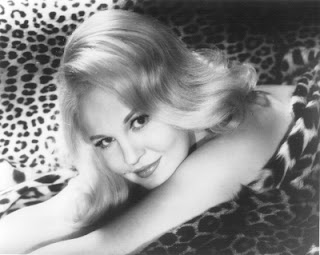Peggy Lee was born Norma Deloris Egstrom in Jamestown, North Dakota. This popular jazz and popular music singer, songwriter, composer, and actress went on to enjoy a career spanning six decades.
From her start as a vocalist on local radio to singing with Benny Goodman's big band, she evolved into a multi-faceted artist and performer. She wrote music for films, acted, and created conceptual record albums—encompassing poetry, jazz, chamber pop, and art songs.
She first sang professionally over KOVC radio in Valley City, North Dakota. She later had her own series on a radio show sponsored by a local restaurant that paid her a "salary" in food. Radio personality Ken Kennedy of WDAY in Fargo, North Dakota changed her name from Norma to Peggy Lee. Seeking bigger and better opportunities, Lee left home and traveled to Los Angeles at the age of 17.
She later made her way to Chicago for a gig at The Buttery Room, a nightclub in the Ambassador Hotel East, where she was noticed by bandleader Benny Goodman who was looking for a replacement for Helen Forrest. She joined his band in 1941 and stayed for two years.
In 1942 Lee had her first #1 hit, "Somebody Else Is Taking My Place,” followed by 1943's "Why Don't You Do Right?" which sold over a million copies. She sang with Goodman's orchestra in two 1943 films, Stage Door Canteen and The Powers Girl.
In March 1943 Lee married Dave Barbour, a guitarist in Goodman's band. Goodman fired Barbour, causing Lee to quit. When Lee and Barbour left the band, they planned for him to work in the studios and she would raise their daughter, Nicki.
Lee drifted back to songwriting and occasional recording sessions for the fledgling Capitol Records in 1947, for whom she produced a long string of hits, including "I Don't Know Enough About You," "It's a Good Day" and the #1-selling record of 1947, "Mañana. In 1948 Lee joined Perry Como and Jo Stafford as a rotating host of the NBC Radio musical program Chesterfield Supper Club. She was also a regular on NBC's Jimmy Durante Show.
She left Capitol in the early 1950s, but returned in 1953. She is most famous for her cover version of the Little Willie John hit "Fever" to which she added her own, uncopyrighted lyrics ("Romeo loved Juliet," "Captain Smith and Pocahontas") and her rendition of Leiber and Stoller's "Is That All There Is?”
For Decca Records, in 1956 she recorded one of her most acclaimed albums, Black Coffee. While recording for Decca, Lee had hit singles with the songs "Lover" and "Mister Wonderful."
(Continued below video and Amazon portals ...)
(Press album or book cover for direct link to the entire Amazon Website):
-----
Lee is today internationally recognized for her signature song "Fever.” She had a string of successful albums and top 10 hits in three consecutive decades. She is regarded as one of the most influential jazz vocalists of all time. From 1957 until 1972, she produced a steady stream of two or three albums per year which usually included standards (often arranged quite different from the original), her own compositions, and material from young artists.
Never afraid to fight for what she believed in, Lee passionately insisted that musicians be equitably compensated for their work. Lee often quoted Ralph Waldo Emerson on the topic: "God will not have his work be made manifest by cowards."
Lee was also an accomplished actress. Lee starred and sang in the hit films The Jazz Singer and Pete Kelly's Blues, for which she received an Academy Award nomination for Best Supporting Actress.
In 1955 Lee did the speaking and singing voices for several characters in Disney's Lady and the Tramp movie: she played the human "Darling" (in the first part of the movie), the dog "Peg,” and the two Siamese cats "Si" and "Am.” In 1957 Lee guest starred on the short-lived ABC variety program, The Guy Mitchell Show.
-----
In her 60-year-long career, Peggy Lee was nominated for 12 Grammy Awards, and was awarded three including the Lifetime Achievement Award, an Academy Award nomination, The American Society of Composers, Authors and Publishers (ASCAP) Award; the President's Award, the Ella Award for Lifetime Achievement, and the Living Legacy Award from the Women's International Center. In 1999 Lee was inducted into the Songwriters Hall of Fame. Lee continued to perform into the 1990s, sometimes in a wheelchair. After years of poor health, Lee died of complications from diabetes and a heart attack at age 81.
####








0 comments:
Post a Comment